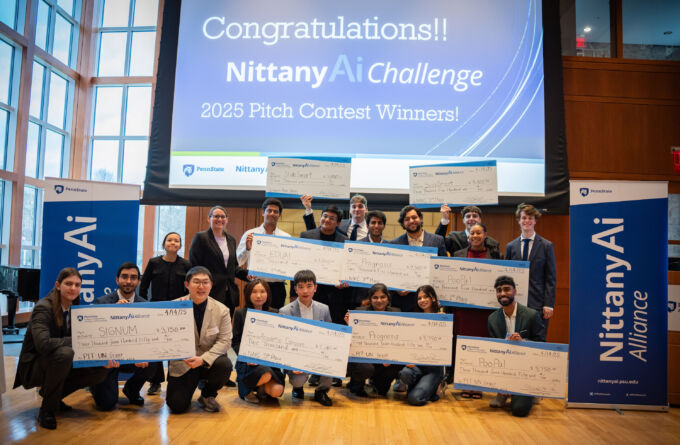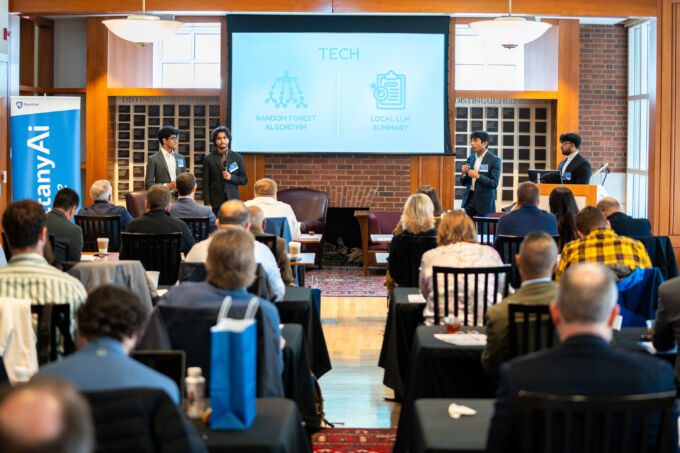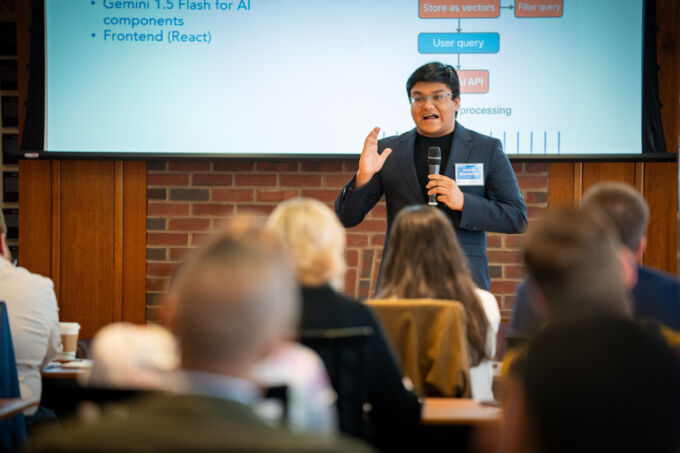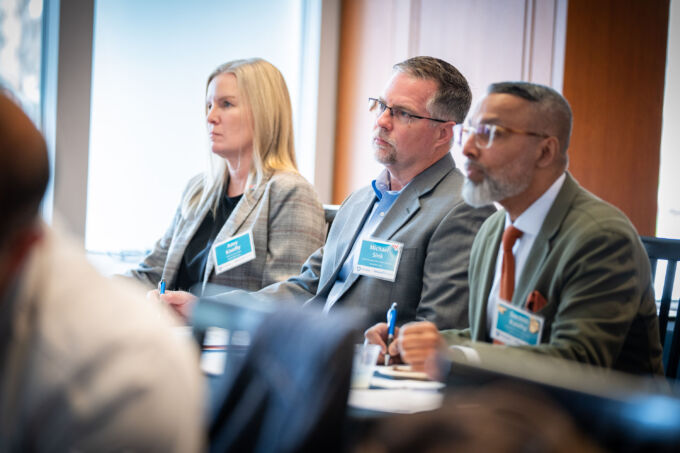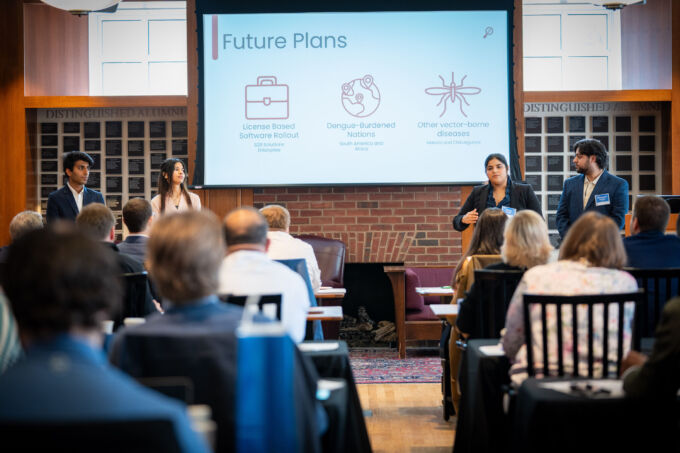Leading the AI Charge
New programs and strategic partnerships are preparing a new generation of AI leaders.
Major News!
Beginning this fall, undergraduate students will have a new major to consider: Artificial Intelligence Methods and Applications (AIMA) in the College of IST. The program— Penn State’s first undergraduate degree program in artificial intelligence—will prepare students to harness the power of AI to transform the way people live, work, and interact with the world.
“With this major, we join the ranks of institutions such as Carnegie Mellon University, the University of Pennsylvania, and MIT in offering a bachelor of science degree specifically in artificial intelligence,” said Lisa Lenze, IST's associate dean for undergraduate studies.
The AIMA program aims to prepare students to design, implement, evaluate, and deploy AI-based solutions for complex real-world problems. Students will learn the technical and interpersonal skills to create AI-based solutions that extend human capabilities. The major equips students with knowledge and expertise in math, computer programming, machine learning, and generative AI, while emphasizing social responsibility and the ethical implications of AI.
Through an innovative curriculum, hands-on projects that mirror real-world complexity, and an emphasis on ethics and impact, students will gain the technical skills to design and deploy robust AI solutions and the insight to ask: What should we build and why? How do we accommodate real-world constraints? And how do the technologies we develop impact humanity?
This interdisciplinary focus on AI problem solving, programming, and algorithm development is critical to leading and advancing organizations in diverse AI-driven industries … and nobody does interdisciplinary like IST.
The college brings a deep history of teaching and researching in the field: Nearly half of the faculty are already involved in AI and AI-related research, and the college is home to the Nittany AI Alliance and the Center for Socially Responsible Artificial Intelligence. The AIMA degree will position graduates to compete in the rapidly evolving AI landscape.
"[The AI Methods and Applications] major empowers students to build intelligent solutions that enhance human capabilities while addressing real-world challenges. With a strong foundation in machine learning, generative AI, and ethical responsibility, students gain the skills to innovate and shape the future of AI-driven industries. It’s the perfect path for aspiring AI pioneers!"
Sharon Huang, David Reese Professor of Information Sciences and Technology and master planner for the degree program

A Strategic Partnership
On January 1, IST became the new home of the Nittany AI Alliance. Combining the college’s academic expertise with the alliance’s experiential learning programs, the partnership promotes a level of synergy that will help propel Penn State as a leader in AI.
"This strategic move to the College of IST marks an exciting new chapter for the Nittany AI Alliance,” said Executive Director Daren Coudriet. “We're creating a powerhouse for AI innovation at Penn State.”
The Nittany AI Alliance creates programs to address real-world problems through experiential learning projects using AI-based solutions. It provides unique out-of-classroom learning opportunities via three programs that facilitate innovative collaboration among businesses and top talent at Penn State and across the commonwealth.
- Nittany AI Advance provides students with hands-on experiences that enhance their classroom learning through AI-related tasks.
- Nittany AI Challenge offers teams of students the chance to compete for funding by developing and presenting AI-based solutions that solve real-world problems. Students leverage diverse skill sets in multidisciplinary teams to experience the true innovation that occurs when working collaboratively to harness the power of AI.
- Nittany AI Inspire demonstrates how artificial intelligence can be applied to create solutions to some of society’s most pressing issues. Students, subject matter experts, and AI companies and partners come together to explore challenges, current and emerging technologies, and the ethical implications of AI’s evolving role in our world.
"This strategic move to the College of IST marks an exciting new chapter for the Nittany AI Alliance. We're creating a powerhouse for AI innovation at Penn State.”
Daren Coudriet, Executive Director, Nittany AI Alliance
2025 Nittany AI Challenge
Read more about the winning teams on Penn State News.

Socially Responsible AI
Launched in 2020, the Center for Socially Responsible Artificial Intelligence (CSRAI) promotes and studies socially responsible ways of building, deploying, and using AI with an emphasis on understanding the social and ethical implications of these activities. Housed in the College of IST and boasting more than 225 faculty and student affiliates from across the University, CSRAI is advancing its mission through a seed grant program, a speaker series, and collaborative research.
The Center also supports and encourages activities that enhance social good through the ethical use of AI and efforts that can mitigate threats from its misuse. Amulya Yadav, associate professor in IST, is CSRAI’s associate director of programs.
-
Bias-a-thon
Participants identified prompts that led generative AI tools to produce biased or stereotype-reinforcing outputs. -
Diagnose-a-thon
Acting as patients and health care providers, participants prompted large language models to generate accurate or potentially harmful medical diagnoses that were then reviewed by physicians. -
Cheat-a-thon
Using only generative AI, students answered faculty- submitted questions that were scored for accuracy. -
Fake-a-thon
One set of participants used generative AI tools to create “believable” fake news stories, and a second set scrutinized the submitted stories among real news reports to determine which were fake.
Because generative AI tools are trained on data created by humans, they reflect human biases and stereotypes that can lead to offensive responses and discriminatory practices.
S. Shyam Sundar, CSRAI director and James P. Jimirro Professor of Media Effects, Bellisario College of Communications

Puzzles, Clickbait, Memes
A new course was introduced last spring to help students discover how computers process language in a way that appears to make sense of human written and spoken text. “Understanding Artificial Intelligence for Human Language” eases undergrads into the concepts of natural language processing (NLP)—the technology behind the chatbots, language translation apps, and generative AI that makes computers seem as if they understand people, identifying and categorizing opinions on social media, or answering the questions people pose in search engines.
Conceptual reasoning, critical thinking, and broader impacts are prioritized over math and algorithms, according to Associate Professor Shomir Wilson, the course’s first instructor. One of Wilson’s goals for the course was to help students understand recently published research about NLP, focusing on papers with practical and social impacts to make them as relatable as possible to the AI that we use or that affects us in everyday life.
As part of a semester-long project, students built NLP systems to perform a variety of tasks, including solving word puzzles, detecting hallucinations by chatbots, spoiling clickbait headlines, and analyzing internet memes.
"Students focus on understanding recent research with practical and social impacts to make it as relatable as possible to the AI that we use or that affects us in everyday life."
Shomir Wilson, Associate Professor

Why Now? Why IST?


The Future of AI
As AI continues to evolve and touch nearly every part of our lives, there are increasing concerns surrounding its impact. There continue to be questions on how AI will affect the arts and technology, but also news, education and more. IST associate professors Hadi Hosseini and Amulya Yadav joined WPSU's Conversations Live to discuss where things currently stand with AI, how advanced it has become, and what the future holds.
Watch the Episode

